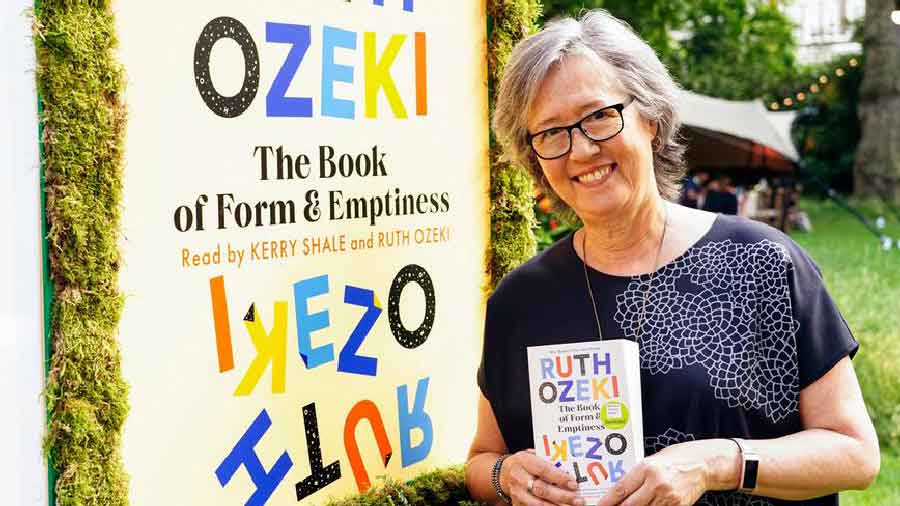The Canadian-American author's prize-winning novel is about a boy who hears objects speaking to him. The award aims to celebrate women's creativity and get more men reading women writers.
The prestigious literary prize was awarded Wednesday to Canadian-American author Ruth Ozeki for her novel The Book of Form and Emptiness.
Now in its 27th year, the Women's Prize for Fiction is given to a female English-language writer from anywhere in the world whose voice rings true.
Ozeki's philisophical story is about a 14-year-old boy and his relationship to the objects in his house, which talk to him after the death of his father.
As the winner, Ozeki takes home 30,000 pounds sterling ($36,000 or €34,900) and a bronze figurine called Bessie, both of which are funded by an anonymous donor. The recognition will, in turn, help the author sell her books and further bring her name to the public.
"This is absurd; I don't win things,'' Ozeki said upon receiving the award.
Ruth Ozeki: 'A masterful storyteller'
The 2022 chair of judges, Mary Ann Sieghart, described Ozeki as "a truly original and masteryful storyteller" and said her book "stood out for its sparkling writing, warmth, intelligence, humour and poignancy. A celebration of the power of books and reading, it tackles big issues of life and death, and is a complete joy to read."
Ozeki, 66, is also an English professor, as well as a filmmaker and Zen Buddhist priest. She said she began meditating on people's relationships to objects while clearing out her deceased parents' house.
"As children, things always are speaking to us and we are always making things speak," she added. "And [I was] trying to get back in touch with that imaginary world, what it's like to be a child and see the whole world as being alive," she explained of the idea behind her novel.
Quite the competition
The 2022 Women's Prize for Fiction shortlist consisted of only six writers and the themes were diverse, from a book narrated by a tree to the experience of an early female aviator in the Antarctic.
Ozeki, the daughter of American and Japanese parents, was considered a long shot in the competition shortlist, which featured novels from a diverse range of English-language authors.
One of the shortlisted books was "The Bread the Devil Knead," by Trinidadian author Lisa Allen-Agostini. It tells the tale of 40-year-old Lisa who, despite her confident outward appearance, is covering up bruises from an abusive relationship.
A new book by Turkish-British novelist Elif Shafak, the author of other popular books such as "The 40 Rules of Love" and the "Bastard of Istanbul," was also in the running. Entitled "The Island of Missing Trees," it is about a forbidden love between a Greek Christian and a Turkish Muslim on the divided island of Cyprus.
The other shortlisted works were New Zealand author Meg Mason's "Sorrow and Bliss,'' American writer Maggie Shipstead's "Great Circle" and American writer Louise Erdrich's "The Sentence."
The 2021 winner was English author Susanna Clarke for her book "Piranesi," about a lonely figure living in a place of wonders referred to as the House, who discovers dark secrets. Other past winners include Zadie Smith, Tayari Jones and Maggie O'Farrell.
Celebrating women's creative achievements
The prize has a long history of seeking to make the voices of women writers heard.
"The aim is always to celebrate women's creative achievements and international writing, whilst also stimulating debate about gender and writing, gender and reading, and how the publishing and reviewing business works," reads a statement on the prize's website.
The idea for the award came about in 1992 when a group of booksellers, journalists, librarians and others in the British publishing industry set out to do something about the fact that prior to that year, only 10% of the novelists shortlisted for the Booker Prize had been women — despite the fact that 60% of the books on the market were written by women.
The group initiated a new prize to recognize female fiction writers and inspire more readers, especially men, to pick up books written by women.
Since its founding, the Women's Prize for Fiction has become one of the top awards in the literary field. The judging panel is also entirely made up of women, as "the founders wanted to celebrate women's critical views as well as their creative achievements," the prize website says.
"I feel like I wouldn't be writing if it wasn't for the support of women and women's institutions,'' Ozeki said in her award remarks.
From Deutsche Welle Newsfeed












